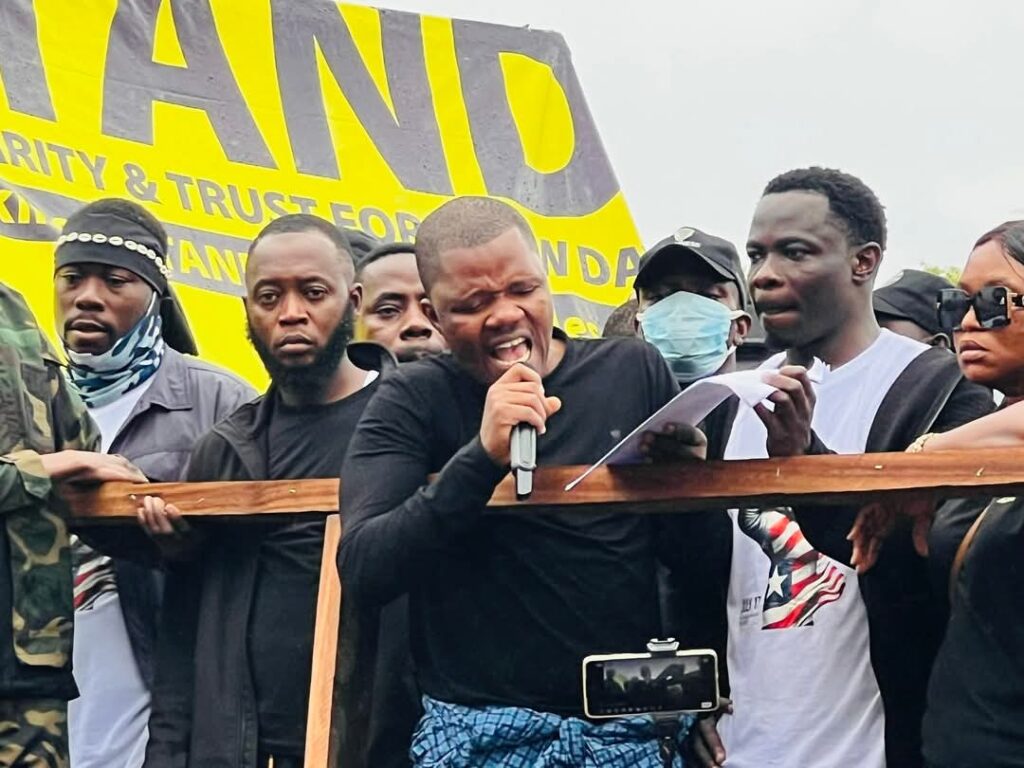Aggrieved citizens under the banner “Enough is Enough” have submitted a detailed 11-count petition to the Government of Liberia following a massive peaceful protest held on July 17, 2025.
Addressed to President Joseph Nyuma Boakai and copied to the Legislature, Judiciary, international community, civil society groups, and human rights organizations, the petition highlights mounting frustrations among Liberians over worsening living conditions, corruption, and failed leadership.
The demonstrators described themselves as the suffering masses—students, market women, motorcycle and tricycle riders, health workers, teachers, soldiers’ wives, rock-crushers, rubber tappers, charcoal sellers, civil servants, and everyday hustlers. They stated that they came in peace but with a unified voice, determined to demand change through lawful and democratic means.
They accused President Boakai of violating his constitutional oath by allowing corruption to flourish under his administration. The protesters said the president has prioritized personal luxury—such as expensive chartered flights and a fleet of luxury Lexus vehicles—over the needs of an already struggling population. They described the current national condition as one of deepening poverty, rising inequality, and a complete breakdown of law and order.
The petition named several top officials for alleged misconduct. Mamaka Bility was accused of interfering in a $2 billion iron ore deal with Pioneer Group LLC and previously being involved in a questionable procurement scandal. Minister of State Sylvester Grigsby was cited for mismanaging millions in unauthorized spending and ghost employee schemes. Mo Ali, Managing Director of LWSC, was accused of defying legislative oversight and manipulating funds for political purposes. Public Works Minister Roland Giddings was linked to over $22 million in road contracts with no tangible results. Patrick Honnah, Commissioner of the Liberia Telecommunications Authority, was criticized for extravagant perks and the misuse of funds intended for telecom improvements.
The Liberia Petroleum Refining Company’s Managing Director Amos Tweh was alleged to have misused public resources for partisan political activities. National Port Authority boss Sekou Dukuly was said to be involved in a secretive $5 million deal with a Chinese businessman, while the Port continues to suffer from inefficiencies and procurement irregularities.
The protesters also accused Police Inspector General Gregory Coleman of transforming the Liberia National Police into a tool of repression. His leadership, they said, has led to brutal crackdowns, illegal arrests, and the killing of peaceful protesters, including three citizens in Kinjor, Grand Cape Mount County. They asserted that these abuses have undermined democracy and public trust in the security forces.
Major General Davidson Forleh, Chief of Staff of the Armed Forces of Liberia, was faulted for ignoring the poor living and working conditions of soldiers, leading to low morale and weakened national defense. Morie Gongolee of LACRA was accused of being at the center of a cocoa export scandal that defrauded the government and hurt Liberian farmers.
Vice President Jeremiah Koung was accused of interfering with the judicial process, particularly in relation to the Supreme Court ruling on the removal of Speaker J. Fonati Koffa. The petition described this as an attack on the independence of the judiciary and a dangerous overreach of executive power.
The petitioners called for the immediate dismissal and prosecution of all officials mentioned and demanded a full, impartial investigation into all credible allegations of corruption, abuse of power, and misconduct. They condemned the growing wealth disparity, stating that while civil servants are underpaid, top officials continue to enjoy inflated salaries and overseas benefits. Hospitals remain underfunded, public schools are falling apart, and the nation’s youth are trapped in hopelessness and joblessness.
They emphasized that the country’s natural resources, including gold, diamonds, and land, are being exploited by foreign companies through shady contracts orchestrated by corrupt insiders. They demanded economic justice, including increased wages, improved public services, youth empowerment programs, and a full audit of all natural resource agreements signed in the past two years.
On the issue of security and human rights, the petition referenced the 2,759 reported rape cases in 2024 and ongoing violence against women and girls, arguing that Liberia is failing its obligations under international human rights conventions. The February 29, 2024 Kinjor killings remain unresolved, and many more citizens—Amanda Nebo, Morris Gomo, Franklin Dargor, Austine Yarkpawolo, Bangalie Kamara, James Kandy, Moses Vesselee, Adama Joe, Armaline Zubah, and others—have died under suspicious circumstances with no justice served.
The petitioners said that ordinary people are routinely harassed, beaten, and detained without cause. Market women and commercial drivers are subjected to daily abuse under unconstitutional restrictions. They declared that the police under Gregory Coleman serve as enforcers for the regime rather than protectors of the public, and demanded his immediate resignation and prosecution.
The protesters criticized the judiciary for becoming a weapon against dissent. Allegations of bribery involving justices have not been investigated, and courts are allegedly used to delay justice and silence critics. They called for full judicial independence and an end to political interference.
Land and housing injustices were also cited, as poor people continue to face demolition of their homes while elites remain untouched in the same neighborhoods. Forced evictions and illegal land grabs persist, and the petitioners called for a fair land policy that protects vulnerable communities.
The petition accused the current administration of recycling corrupt officials and failing to deliver on campaign promises. They called for constitutional reforms that would allow citizens to recall elected officials who fail to perform or engage in dishonest practices.
In their concluding message, the protesters declared they are tired of being ignored, lied to, and subjected to endless suffering. They said their peaceful demonstration is a warning and a demand—not a plea. They are demanding justice, dignity, and the rebirth of a New Liberia. They vowed to continue their campaign until meaningful action is taken by the government.

